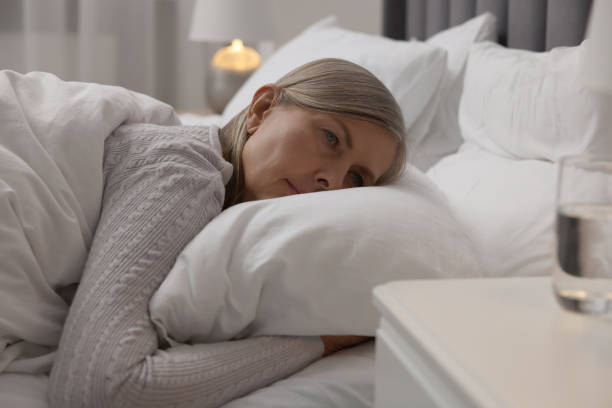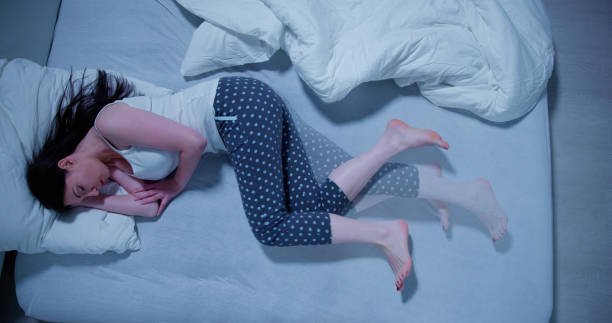There comes a moment in many women’s lives when nightfall no longer brings peaceful rest, but rather a frustrating cycle of tossing, turning, sweating, and sighing. This moment is called menopause, and for millions of women, it marks a profound change not only in hormones but in the quality of their sleep. While society often treats menopause as just a “hot flash” phase or a quirky joke about aging, the reality is far more complex—and for many, far more distressing.
Sleep problems are one of the most commonly reported symptoms of menopause. Even women who have always been solid sleepers find themselves wide awake at 3 a.m., hearts racing, blankets soaked, minds buzzing. Others drift off easily but wake repeatedly through the night, never reaching the deep, restorative stages of sleep the body so desperately needs. And the frustrating part? This isn’t caused by one single factor—it’s a cocktail of hormonal changes, physical symptoms, emotional shifts, and environmental influences.
Understanding why menopause affects sleep is the first step toward reclaiming your rest. Estrogen and progesterone, two key female hormones, begin to decline during perimenopause and into menopause. Estrogen is involved in regulating the body’s temperature and maintaining healthy levels of serotonin, which influences mood and sleep cycles. Progesterone has a calming effect on the brain and acts as a natural sedative. When both take a nosedive, sleep disturbances often rise to take their place.
But hormones don’t act alone. Hot flashes and night sweats—hallmark symptoms of menopause—can jolt you awake drenched in sweat and needing to change clothes or sheets. Anxiety, which can ramp up during menopause, adds fuel to the insomnia fire. Even changes in your circadian rhythm (the internal clock that regulates sleep) may make falling and staying asleep more challenging than ever before.
When Nights Become the Enemy: The Emotional Toll of Sleeplessness
Sleep is not just a time when your body lies still. It’s when your brain processes emotions, your immune system recharges, your cells repair themselves, and your mind resets. Without it, everything—from your mood to your memory to your metabolism—starts to unravel.
Women going through menopause often find that poor sleep bleeds into every corner of their lives. They feel foggy at work, irritable with family, disconnected from their partners. Some describe themselves as “living in a haze” or “barely functioning” during the day. And then, as night falls, the dread begins anew: another night of interrupted sleep and a long, exhausting day to follow.
It’s important to recognize the emotional weight of menopausal insomnia. It’s not just about feeling tired; it’s about the mental fatigue, the anxiety about not sleeping, the worry that this might never end. In some cases, chronic sleep loss can lead to depression or worsen existing mental health issues. Yet too often, these struggles are minimized or misunderstood—even by healthcare providers.
This is not just a battle of the body, but a battle of the mind. And both need to be addressed to truly heal.
Rethinking Rest: What Real Sleep Looks Like During Menopause
Many people believe that a “good night’s sleep” means eight uninterrupted hours of slumber. But sleep doesn’t always work that way, especially in midlife and beyond. Even among people who don’t have menopause to contend with, sleep tends to fragment with age. For women in menopause, redefining what successful sleep means can reduce stress and shift the focus from perfection to progress.
The goal isn’t necessarily to sleep like you did in your twenties—though that might happen again someday—but to establish a routine where sleep becomes more predictable, more peaceful, and more restorative. That might mean waking once or twice in the night but falling back asleep with ease. It might mean shortening the time it takes to fall asleep or decreasing the intensity of night sweats so that they don’t pull you out of deep sleep. It might also mean using new strategies—both scientific and holistic—to support better sleep patterns.
Achieving better sleep during menopause isn’t a one-size-fits-all situation. What works for one woman may not work for another. But there are pillars—sleep hygiene, hormonal balance, emotional support, lifestyle changes, and sometimes medical interventions—that can build a framework for better nights. You don’t have to accept sleep disruption as your new normal.
The Hormonal Puzzle: Rebalancing the Internal Clock
Hormones are like conductors in a symphony. When they’re balanced, everything runs smoothly. When they’re off, even slightly, the entire performance can collapse into chaos. This is especially true when it comes to sleep.
As estrogen and progesterone levels fall, the body’s internal systems react in various ways. Estrogen’s decline is linked to hot flashes, mood changes, and even sleep apnea. Progesterone, often called the “relaxing hormone,” helps you fall asleep and stay asleep; its loss can cause restlessness and anxiety. Cortisol, the stress hormone, may also rise during menopause, especially if you’re under a lot of pressure or not sleeping well, creating a vicious cycle of stress-induced insomnia.
Rebalancing hormones isn’t always about replacing them. For some women, lifestyle and dietary changes can support better hormone function. For others, bioidentical or conventional hormone replacement therapy (HRT) may provide relief. These options should always be discussed with a healthcare provider, but it’s worth noting that HRT has been shown in numerous studies to improve sleep, especially when taken early in menopause and with appropriate monitoring.
Phytoestrogens—plant-based compounds found in foods like soy, flaxseed, and lentils—may also have a mild estrogen-like effect and help with symptoms like hot flashes that interfere with sleep. Adaptogenic herbs like ashwagandha, maca root, and rhodiola are gaining popularity for their potential to support hormonal balance and reduce stress.
Body Temperature Battles: Cooling the Heat of the Night
For many menopausal women, the biggest sleep thief isn’t insomnia in the traditional sense—it’s waking up drenched in sweat, heart pounding, covers kicked off, body on fire. These sudden surges of heat, often followed by chills, are a direct result of fluctuating estrogen levels that affect the hypothalamus—the part of the brain that regulates temperature.
Night sweats are particularly disruptive because they jolt the body out of deeper stages of sleep. Over time, this leads to sleep fragmentation and daytime fatigue. Fortunately, there are practical ways to tame the night heat.
Wearing moisture-wicking sleepwear made of bamboo or breathable cotton can help regulate body temperature. So can sleeping with layered bedding you can easily remove and putting a fan by the bed or using a cooling pillow. Some women find relief with chilled gel pads or cooling mattress toppers that reduce overall body heat during sleep.
On a deeper level, reducing inflammation through diet and lifestyle can also help. Spicy foods, alcohol, and caffeine often trigger night sweats. Keeping a symptom diary can help identify personal triggers and eliminate the worst offenders. While temperature regulation may not solve everything, it can make a huge difference in how restful your sleep becomes.
Mental Clutter: Quieting the Racing Mind
Even when the body is still, the mind may not be. Another major culprit behind menopausal sleep struggles is anxiety—about health, aging, family, career, and the world at large. Midlife is often a storm of shifting roles and identities. Children are growing up, parents are aging, careers are evolving or ending, and the sense of purpose that once defined your days may be shifting. Add hormonal instability into the mix, and the result is a mental storm that can rage all night.
Learning to quiet the mind is essential. But contrary to popular belief, relaxation isn’t about emptying your head or trying not to think. It’s about giving your brain something else to focus on. Guided meditations, body scans, or progressive muscle relaxation can slow the nervous system. Breathing techniques like 4-7-8 breathing help regulate the heart rate and signal to the brain that it’s safe to sleep.
Journaling before bed can also help “download” mental clutter onto paper, freeing your mind to rest. Apps like Calm, Insight Timer, or Headspace provide structured paths to relaxation, and even 10 minutes a night can create measurable improvements in sleep quality.
Don’t underestimate the power of a nighttime ritual. Creating a sense of predictability and calm before bed trains your brain to associate certain activities—reading, gentle yoga, aromatherapy—with winding down. Sleep isn’t just something that happens; it’s something you prepare for, emotionally as well as physically.
Rebuilding Your Sleep Environment
Your bedroom is not just a place to crash—it’s a sacred space for healing. But for many women, it’s filled with triggers for poor sleep: harsh lighting, clutter, glowing devices, or even emotional associations with stress.
Optimizing your sleep environment can dramatically improve your rest. Think cool, dark, quiet, and clean. Consider blackout curtains to block out light, white noise machines or calming playlists to muffle disturbances, and essential oils like lavender or chamomile to create a soothing sensory experience. Keep electronics out of the bedroom if possible, or at the very least, use night mode and dim brightness an hour before bed.
Mattresses and pillows can also make or break your night. As the body changes, joint pain or back issues may become more prominent, so ensure your bed supports your current needs, not your 25-year-old self’s.
Finally, make your bedroom a judgment-free zone. No obsessing over how much you’ve slept, no punishing yourself for waking up. Rest comes more easily when your body feels safe, and your mind feels welcomed.
Rewriting the Sleep Story: Cognitive Behavioral Tools
One of the most powerful tools for tackling chronic insomnia is cognitive behavioral therapy for insomnia (CBT-I). This form of therapy addresses the thoughts and behaviors that interfere with sleep and has been shown to be as effective—if not more so—than sleep medications.
CBT-I teaches techniques like stimulus control (using the bed only for sleep and intimacy), sleep restriction (limiting time in bed to increase sleep drive), and cognitive restructuring (challenging unhelpful thoughts like “If I don’t sleep, I’ll ruin tomorrow”). For menopausal women, CBT-I can be especially helpful because it offers personalized tools that work alongside hormonal changes rather than ignoring them.
You don’t necessarily need a therapist to start CBT-I—online programs, apps, and workbooks make it more accessible than ever. What’s key is consistency and willingness to challenge long-held beliefs about sleep. Your brain is capable of rewiring itself, even in menopause.
When to Consider Medical Support
Sometimes, even after making all the right changes, sleep remains elusive. If you’re regularly getting less than five hours of sleep, experiencing severe daytime fatigue, or showing signs of sleep disorders like sleep apnea, it’s time to talk to a doctor.
Menopausal women are at increased risk for sleep apnea due to changes in muscle tone and weight distribution. Symptoms include loud snoring, gasping for air at night, and waking up feeling unrefreshed. A sleep study can provide answers and open the door to effective treatment options like CPAP or positional therapy.
For some women, short-term use of sleep medications or low-dose antidepressants can be helpful, especially when insomnia is paired with anxiety or depression. However, these should be used with caution and always under medical supervision.
What’s important is not to suffer in silence. Sleep is not a luxury; it’s a biological necessity. And you have every right to fight for it.
The Power of Hope: Menopause and the Promise of Rest
It’s easy to feel defeated when night after night passes in a haze of heat, wakefulness, and worry. But menopause doesn’t have to mark the end of restful sleep. It’s a chapter—a significant one, yes—but not the conclusion.
Every woman’s menopausal journey is different, but within each experience lies the potential for profound transformation. Sleep, once elusive, can become sacred again. With the right support, tools, and compassion for yourself, you can rebuild a relationship with rest that carries you through menopause and into a vibrant, energized future.
It starts with understanding. It continues with action. And it ends—not with exhaustion—but with peace.






